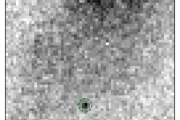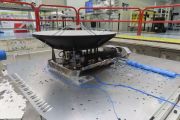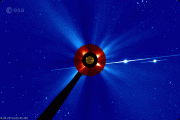
Copernical Team
K dwarf survey maps stellar neighborhood for habitable worlds
 A Georgia State University astronomy graduate student has led a new survey of nearby K-type stars to identify targets where Earth-like planets could provide conditions suitable for life. Sebastian Carrazco-Gaxiola presented the results at the January 2026 meeting of the American Astronomical Society in Phoenix, Arizona.
The project delivers the first comprehensive spectroscopic census of t
A Georgia State University astronomy graduate student has led a new survey of nearby K-type stars to identify targets where Earth-like planets could provide conditions suitable for life. Sebastian Carrazco-Gaxiola presented the results at the January 2026 meeting of the American Astronomical Society in Phoenix, Arizona.
The project delivers the first comprehensive spectroscopic census of t NASA selects industry partners to mature Habitable Worlds Observatory technologies
 NASA has chosen a set of industry proposals to advance technologies for its Habitable Worlds Observatory concept, a planned flagship space telescope intended to directly image Earth-like planets around Sun-like stars and analyze their atmospheres for potential signs of life.
The observatory is also expected to support a broad astrophysics program and contribute to planning for future human
NASA has chosen a set of industry proposals to advance technologies for its Habitable Worlds Observatory concept, a planned flagship space telescope intended to directly image Earth-like planets around Sun-like stars and analyze their atmospheres for potential signs of life.
The observatory is also expected to support a broad astrophysics program and contribute to planning for future human China geospatial information industry approaches 1 trillion yuan output
 China's geospatial information sector, a key component of digital mapping and positioning, is approaching a scale of 1 trillion yuan, according to the Ministry of Natural Resources.
The industry is expected to have exceeded 900 billion yuan in output for 2025, representing growth of more than 30 percent compared with 2020, and it employs more than 4 million people.
At the core of the
China's geospatial information sector, a key component of digital mapping and positioning, is approaching a scale of 1 trillion yuan, according to the Ministry of Natural Resources.
The industry is expected to have exceeded 900 billion yuan in output for 2025, representing growth of more than 30 percent compared with 2020, and it employs more than 4 million people.
At the core of the Milky Way black hole flare leaves X ray echoes in nearby gas cloud
 Our galaxy's supermassive black hole is among the faintest known, yet new observations indicate it was far more active in the recent past on cosmic timescales. Sagittarius A*, at the Milky Way's center, appears to have produced a powerful X ray flare within the last few hundred to 1,000 years, leaving an observable imprint in surrounding gas.
Michigan State University researcher Stephen Di
Our galaxy's supermassive black hole is among the faintest known, yet new observations indicate it was far more active in the recent past on cosmic timescales. Sagittarius A*, at the Milky Way's center, appears to have produced a powerful X ray flare within the last few hundred to 1,000 years, leaving an observable imprint in surrounding gas.
Michigan State University researcher Stephen Di Jupiter's moon Europa has a seafloor that may be quiet and lifeless
 The giant planet Jupiter has nearly 100 known moons, yet none have captured the interest and imagination of astronomers and space scientists quite like Europa, an ice-shrouded world that is thought to possess a vast ocean of liquid salt water. For decades, scientists have wondered whether that ocean could harbor the right conditions for life, placing Europa near the top of the list of solar syst
The giant planet Jupiter has nearly 100 known moons, yet none have captured the interest and imagination of astronomers and space scientists quite like Europa, an ice-shrouded world that is thought to possess a vast ocean of liquid salt water. For decades, scientists have wondered whether that ocean could harbor the right conditions for life, placing Europa near the top of the list of solar syst NASA's IXPE Measures White Dwarf Star for First Time
 For the first time, scientists have used NASA's IXPE (Imaging X-ray Polarization Explorer) to study a white dwarf star. Using IXPE's unique X-ray polarization capability, astronomers examined a star called the intermediate polar EX Hydrae, unlocking the geometry of energetic binary systems.
In 2024, IXPE spent nearly one week focused on EX Hydrae, a white dwarf star system located in the c
For the first time, scientists have used NASA's IXPE (Imaging X-ray Polarization Explorer) to study a white dwarf star. Using IXPE's unique X-ray polarization capability, astronomers examined a star called the intermediate polar EX Hydrae, unlocking the geometry of energetic binary systems.
In 2024, IXPE spent nearly one week focused on EX Hydrae, a white dwarf star system located in the c Star like early galaxies challenge views of cosmic evolution
 Scientists at the University of Missouri have identified a small group of unusual objects in the early universe that look like stars in images yet behave like compact galaxies when analyzed in detail. Using NASAs James Webb Space Telescope JWST, Haojing Yan and colleagues at Mizzous College of Arts and Science found that these sources appear as single points of light while carrying the spectral
Scientists at the University of Missouri have identified a small group of unusual objects in the early universe that look like stars in images yet behave like compact galaxies when analyzed in detail. Using NASAs James Webb Space Telescope JWST, Haojing Yan and colleagues at Mizzous College of Arts and Science found that these sources appear as single points of light while carrying the spectral We have no idea what most of the universe is made of, but scientists are closer than ever to finding out
 When it comes to understanding the universe, what we know is only a sliver of the whole picture. Dark matter and dark energy make up about 95% of the universe, leaving only 5% "ordinary matter," or what we can see. Dr. Rupak Mahapatra, an experimental particle physicist at Texas A&M University, designs highly advanced semiconductor detectors with cryogenic quantum sensors, powering experiments w
When it comes to understanding the universe, what we know is only a sliver of the whole picture. Dark matter and dark energy make up about 95% of the universe, leaving only 5% "ordinary matter," or what we can see. Dr. Rupak Mahapatra, an experimental particle physicist at Texas A&M University, designs highly advanced semiconductor detectors with cryogenic quantum sensors, powering experiments w Sentinel-1's decade of essential data over shifting ice sheets

The extent and speed of ice moving off the ice sheets of Greenland and Antarctica into the sea – an important dynamic for climate and sea-rise modelling – has been captured over a 10-year period by satellites from the Copernicus Sentinel-1 mission.
Snow-covered Amsterdam
 Image:
This image, captured by the Copernicus Sentinel-2 mission on 6 January 2026, shows Amsterdam in the Netherlands blanketed in snow.
Image:
This image, captured by the Copernicus Sentinel-2 mission on 6 January 2026, shows Amsterdam in the Netherlands blanketed in snow. 



































